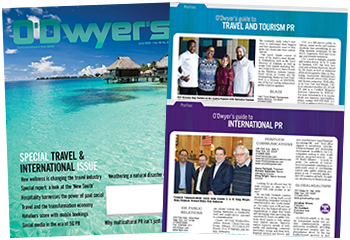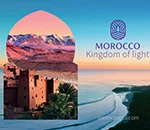 Kerry Anne Watson |
Among our many roles as counselors, strategists, marketers — and as the occasional message contortionists for clients — PR professionals representing travel brands maintain the pulse of consumer behavior and how it affects global destinations, hotels, resorts and travel partners. And though we have yet to reach the halfway point of the year, our agency is prepared to proclaim 2018 as the year of transformational travel.
While the desire for experiential travel remains alive and well, the trend has moved toward travel that has a greater impact on the lives of the traveler than simply creating indelible memories. In January, Skift highlighted this shift as a tipping point in its annual travel industry trends forecast, “Personal Fulfillment is the New Ultimate Luxury.” As more and more consumers seek travel experiences for a personal evolution, travel brands are keeping the pace by developing programming and amenities to meet them upon arrival.
|
|
This goes beyond the desire for experiences just for the sake of the experience. Travelers — especially the affluent — seek an emotional and psychological transformation as a result of the travel experience. The “personal improvement” trend has been accelerating since at least 2015, with 84 percent of Boomers and 94 percent of Millennials making personal improvement commitments, including online courses, webinars, apps and video classes, according to Forbes. From a macro-trend perspective, this is a direct result of consumers feeling hesitant about the chaotic world we’re currently living in: divisive politics, shaky economy, global terrorism. This world contributes to consumers’ sense of unease. And consumers are self-medicating through travel.
The most transformative experiences help consumers learn something new and gain a new perspective on their lives. In a recent survey, nearly 40 percent of affluent U.S. travelers noted that food, arts and wellness were key elements that led to a transformative vacation. We’re seeing “wellness” blossom into multidimensional experiences designed to elevate travelers to be at their personal best. From Bhutan’s “Six Senses Discovery Retreat” to Survivor-style trips in the Amazon with physical and personal challenges, to even Ayahuasca and cannabis-based tourism, consumers are demanding transformative experiences that use the power of epic storylines, where the traveler is the “pilgrim in an immersive story,” according to the Skift forecast.
Luxury travelers are seeking more a remote and locally-cultural feel to their travel experience. According to March consumer research from Iconoculture, non-traditional stays are increasing across the board: nature lodges are up 700 percent, ryokans up 600 percent, yurts 155 percent and even RV/campers are up 133 percent. An Estonian-based travel company is creating pre-fabricated, temporary accommodation hotel rooms. All provide examples of the consumer need for a different type of travel, one that will challenge the boundaries of what they usually expect or need. Hotels and resorts will be smart to grasp this concept and comply.
 The Zimmerman Agency is PR firm of record for Park City, Utah’s tourism development agency, Visit Park City. |
Imagination is another facet of transformative travel emerging in destination marketing. Using the tagline “Only Slightly Exaggerated,” the state of Oregon taps into the concept of authenticity through an exaggerated imagination. Knowing that destination marketing has a habit of selectively portraying only the most attractive part of the destination, Oregon goes over the top to stir curiosity and invite consumers to step into a world where they can be transformed. For those of us working in travel public relations, this is an amazing opportunity and creative palette for transformational — and, yes, fun — ideas.
The concept is now apparent in destination weddings. The Zimmerman Agency has done a considerable amount of romance and bridal work with exclusive resort clients around the world. We’ve witnessed transformative experiences for destination weddings using a distinct balance of local culture and personalized experience, as these weddings shift away from formal occasions to become truly reflective of the unique culture of the destination and personalities of the couples. It is a growing trend that is picking up momentum as the more customized and personal nature of the experience meets every criterion for transformational travel.
Traveler imagination can also be fueled in the planning process for vacations, once the technology around virtual reality is sophisticated enough to get us there. To date, brands haven’t been able to hold consumer attention beyond the initial “wow” factor, but the technology is tailor-made to give consumers a taste of transformation, even if they’re just sitting in their living rooms. Marriott’s VRoom Service is an early example of a hotel brand using this technology to entice consumers desire for something bigger than just an experience.
We view transformational travel as a fresh way to provide creative solutions for hospitality brands. Public relations is a rich proving ground for differentiating messages that enable potential guests and visitors to; create an identity through their travel experiences; enjoy transformative experiences that enrich them culturally, educationally and spiritually, and; find purpose and meaning in their travel.
***
Kerry Anne Watson is president at The Zimmerman Agency.



 Weber Shandwick is providing PR and marketing communications services to the Moroccan National Tourist Office in New York.
Weber Shandwick is providing PR and marketing communications services to the Moroccan National Tourist Office in New York. Finn Partners has filed its six-month contract with the Bahamas Ministry of Tourism, Investments & Aviation, which is worth $240K.
Finn Partners has filed its six-month contract with the Bahamas Ministry of Tourism, Investments & Aviation, which is worth $240K. Weber Shandwick wrapped up its work for the Ministry of Bahamas at the end of 2023.
Weber Shandwick wrapped up its work for the Ministry of Bahamas at the end of 2023. The Aruba Tourism Authority is boosting its budget 29.4 percent to $2.2M at Zeno Group, according to its 2024 contract, effective Jan. 1.
The Aruba Tourism Authority is boosting its budget 29.4 percent to $2.2M at Zeno Group, according to its 2024 contract, effective Jan. 1. As inflation continues to impact spending, consumers are revisiting their list of what they’re willing to spend more of their money on. Luckily for those in the travel industry, experiences seem to be trending up on the “splurge” list.
As inflation continues to impact spending, consumers are revisiting their list of what they’re willing to spend more of their money on. Luckily for those in the travel industry, experiences seem to be trending up on the “splurge” list. 


 Have a comment? Send it to
Have a comment? Send it to 
No comments have been submitted for this story yet.